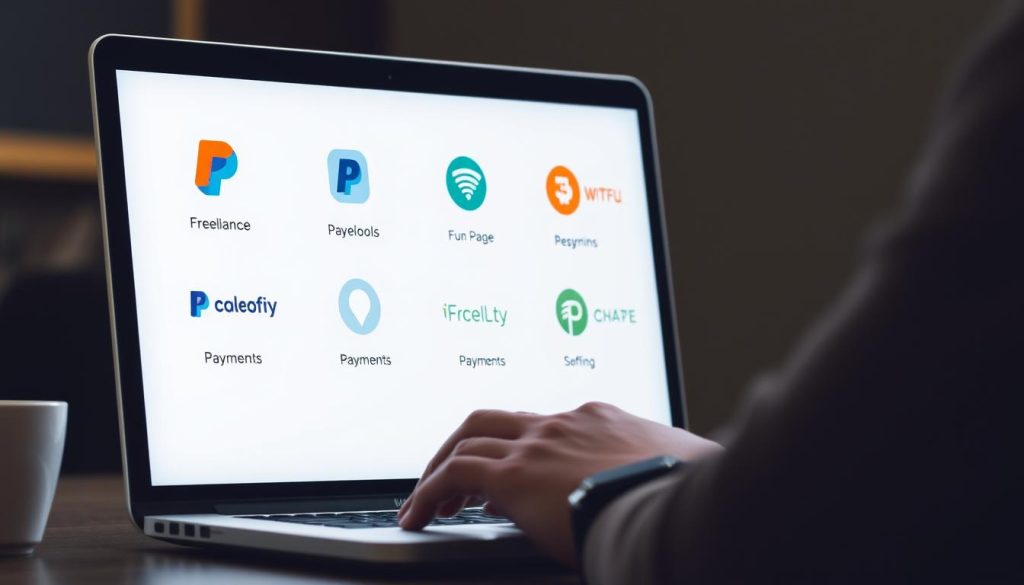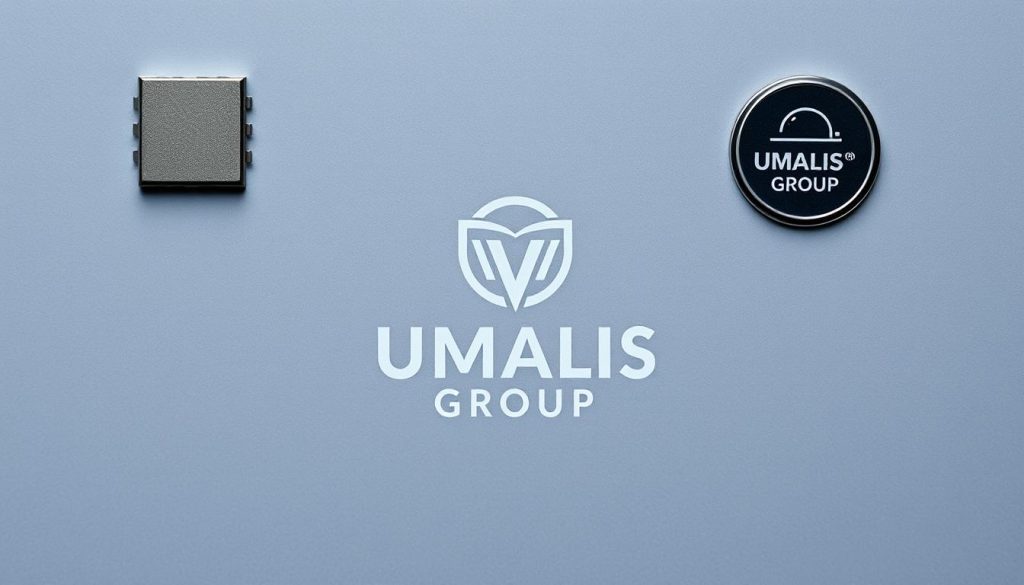As a freelancer, managing your finances securely is crucial for a stable career. You need reliable payment solutions that not only protect your earnings but also enhance your professional image.
The world of payment methods has evolved significantly, offering various options for secure transactions. From traditional bank transfers to modern digital wallets, freelancers can choose services that best suit their needs.
Understanding these options is key to ensuring timely and secure payment for your work.
Table of Contents
Key Takeaways
- Freelancers have multiple secure payment options.
- Each payment method has its advantages and drawbacks.
- Choosing the right payment method can enhance your professional image.
- Secure transactions are crucial for financial stability.
- Understanding payment options is essential for freelancers.
Understanding Payment Methods for Freelance Work
Understanding various payment methods is essential for freelancers to maintain a stable and efficient business. When selecting payment methods for financial transactions, consider factors such as security, convenience, and cost-effectiveness. Assessing the specific needs of your transaction helps determine the most appropriate choice.
The payment methods you choose directly impact your cash flow, which is crucial for your financial stability. Having multiple payment options can expand your client base and improve your competitiveness in the global freelance marketplace. Security considerations should be paramount as freelancers are vulnerable to payment fraud and identity theft.
Why Payment Methods Matter for Freelancers
The right payment methods can significantly enhance your financial stability by ensuring timely and secure transactions. Freelancers often face challenges related to payment delays or fraud, making it critical to choose methods that offer robust protection.
- Multiple payment options can attract a broader client base.
- Security features protect against fraud and identity theft.
- Efficient payment processing improves cash flow.
Key Factors to Consider When Choosing Payment Options
When evaluating payment methods, consider factors such as processing times, transaction fees, accessibility, and client preferences. Understanding the differences between various types of payment methods helps create a balanced approach that protects your interests while providing convenience to your clients.
| Payment Method | Processing Time | Transaction Fees | Security Features |
|---|---|---|---|
| Credit Cards | Immediate | 2-3% | High |
| Bank Transfers | 1-3 days | $5-$10 per transfer | High |
| Digital Wallets | Immediate | 1-2% | High |
Credit and Debit Cards as Freelance Payment Options
Freelancers can benefit significantly from using credit and debit cards, which offer a range of benefits, including protection and rewards.

Credit and debit cards are widely used for payments, with transactions totaling £884 billion in 2021. Debit cards are directly linked to your bank account, deducting funds immediately, while credit cards involve a credit card company that pays the retailer first, requiring you to pay later.
Credit Cards: Benefits and Protection Features
Credit cards offer freelancers significant protection, including the ability to dispute charges and extended fraud protection. Many credit cards also offer rewards programs, such as cashback or travel points, which can be beneficial for freelancers. When accepting credit cards, consider processing fees, which typically range from 2.5% to 3.5% per transaction.
For international clients, credit cards often provide competitive currency conversion rates, although foreign transaction fees may apply. This makes credit cards a viable option for freelancers with global clients.
Debit Cards: Direct Access to Your Funds
Debit card payments provide immediate access to your funds without the risk of debt accumulation, making them a straightforward option for freelancers who prefer direct banking. Debit card payments may process more quickly than credit card payments, typically clearing within a shorter timeframe.
When choosing between credit and debit cards, freelancers should consider their specific needs, including the need for protection, ease of use, and processing times. By understanding the features of both credit and debit cards, freelancers can make informed decisions about their payment options.
Bank Transfers and Direct Deposits
Understanding bank transfers and direct deposits is vital for freelancers to manage their finances effectively. These payment methods offer a secure and reliable way to receive payments from clients.

Domestic Bank Transfers
Domestic bank transfers are a secure and often low-cost method for receiving payments from clients within your country. They typically clear within 1-3 business days, making them a convenient option for freelancers.
Setting up a dedicated business bank account for your freelance work helps maintain a clear separation between personal and professional finances. This simplifies tax reporting and business expense tracking.
International Wire Transfers
International wire transfers are reliable for global clients but often involve higher fees and less favorable exchange rates. Costs can range from $15-50 per transaction, depending on your banking institution.
For freelancers with international clients, maintaining bank accounts in multiple currencies can help minimize conversion fees and protect against exchange rate fluctuations.
Setting Up Direct Deposits for Regular Clients
Establishing direct deposit arrangements with regular clients can significantly reduce payment delays and administrative work for ongoing relationships.
Understanding the security protocols of different bank transfer systems helps protect your linked bank account information when sharing details with clients.
Digital Wallets and Mobile Payment Solutions

The rise of digital payment systems has transformed how freelancers receive payments, offering enhanced security and convenience. Digital wallets store your payment information securely, allowing for quick online payments. They offer a blend of convenience and security but require compatible apps and internet access.
Popular Digital Wallet Options
Digital wallets like PayPal, Stripe, and Wise offer freelancers enhanced security through tokenization technology, protecting your financial information during each transaction. Some key benefits include:
- Faster access to your funds compared to traditional payment methods
- Competitive currency conversion rates for international transactions
- Integration capabilities with accounting software for streamlined financial management
- Prepaid card options linked to your digital balance for additional flexibility
Mobile Payment Apps for On-the-Go Freelancers
Mobile payment solutions provide the flexibility to manage your freelance business finances on-the-go, allowing you to send invoices, accept payments, and track expenses from anywhere. When choosing a mobile payment app, consider factors such as transaction fees, security features, and compatibility with your devices.
Some popular mobile payment apps offer features like instant transfers, automated invoicing, and expense tracking. By leveraging these tools, freelancers can maintain a professional financial management system, even when working remotely.
Online Payment Platforms Designed for Freelancers

Freelance payment platforms have evolved to provide secure, efficient, and user-friendly services for independent professionals. These platforms cater to the unique needs of freelancers, offering features that simplify financial transactions and improve cash flow management.
Dedicated Freelance Payment Services
Specialized freelance payment platforms like Payoneer, Wise (formerly TransferWise), and Revolut offer features specifically designed for independent professionals. These include multi-currency accounts and competitive exchange rates, making it easier for freelancers to manage international payments. Additionally, these dedicated services often provide additional business tools beyond simple payment processing, such as invoice generation, time tracking, and contract management to streamline administrative workflows.
Many freelance-focused payment services offer virtual bank accounts in multiple countries, allowing freelancers to receive payments as if they had a local bank account. This reduces fees for both the freelancer and their customers, making international transactions more cost-effective.
Integration with Project Management Tools
Freelance payment platforms are increasingly integrating with popular project management tools like Asana, Trello, and Monday.com. This integration creates seamless workflows from project completion to payment, enhancing efficiency and reducing administrative burdens. By connecting project management tools with payment platforms, freelancers can ensure timely and accurate payments, improving their overall financial management.
Understanding the verification requirements for different payment platforms is essential, as more robust services may require additional documentation to comply with international financial regulations. Some platforms offer escrow services that hold client funds until project completion, providing security for both parties in larger or longer-term freelance engagements.
The reporting features of dedicated freelance payment services can significantly simplify tax preparation by categorizing income, tracking expenses, and generating financial statements tailored to self-employed professionals. This level of financial organization not only saves time but also helps freelancers maintain better control over their financial access and planning.
Understanding Payment Methods Security Features

Securing your freelance income requires a thorough understanding of the security features associated with different payment methods. As a freelancer, you must be aware of the various security measures that payment methods employ to protect your earnings.
Modern payment methods utilize advanced security protocols to safeguard your financial information. Encryption and authentication measures play a crucial role in securing payment transactions.
Encryption and Authentication Measures
Modern payment methods employ sophisticated encryption protocols to protect your sensitive financialinformationduring transmission and storage. The industry standard for encryption is 256-bit, ensuring that your data remains secure. Two-factor authentication (2FA) and biometric verification add crucial security layers to payment platforms, significantly reducing the risk of unauthorized access to your freelance earnings. For instance, when using digital wallets or online payment platforms, these security measures ensure that your payment information is protected.
Furthermore, when accepting credit cards, it is essential to ensure that the platform you use is PCI DSS (Payment Card Industry Data Security Standard) compliant. This compliance ensures that your clients’ payment information is handled according to rigorous security requirements.
Fraud Protection and Dispute Resolution
Understanding the dispute resolution processes of different payment methods is essential for protecting yourself against non-payment or fraudulent chargebacks from clients. Many payment platforms offer seller protection policies that can shield freelancers from certain types of payment fraud, though coverage varies significantly between services. For example, credit cards typically offer stronger fraud protection than debit cards, with zero-liability policies that can be crucial for freelancers.
To further safeguard your earnings, it is crucial to implement proper security practices, such as using unique passwords and secure networks when accessing payment accounts. By combining these practices with the security features of your chosen payment methods, you can significantly reduce the risk of payment-related issues.
- Modern payment methods use encryption protocols to protect financial information.
- Two-factor authentication and biometric verification enhance security.
- PCI DSS compliance is crucial when accepting credit cards.
- Understanding dispute resolution processes is vital for freelancers.
- Seller protection policies can shield freelancers from payment fraud.
Managing International Payments and Currency Exchange
Managing international payments effectively is key to maintaining a successful freelance career in today’s global economy. As a freelancer, you need to navigate the complexities of cross-border transactions, currency conversion, and associated fees.

Currency Conversion Considerations
When dealing with international payments, understanding currency conversion is vital. International payments involve multiple potential fees, including currency conversion charges, intermediary bank fees, and recipient bank charges, which can collectively reduce your earnings by 3-7%. Specialized services like Wise and Payoneer offer competitive exchange rates compared to traditional bank transfers.
The concept of the mid-market exchange rate is crucial in evaluating whether you’re receiving a fair conversion rate. Strategic timing of currency conversions can significantly impact your earnings, as exchange rates fluctuate constantly based on global economic factors.
Reducing International Transfer Fees
To minimize losses, consider maintaining accounts in multiple currencies, which can be advantageous for freelancers with regular clients in specific regions. Some payment platforms offer « hold » features that allow you to keep funds in the original currency until exchange rates are more favorable.
It’s also essential to understand the tax implications of currency gains and losses, requiring careful record-keeping of exchange rates at the time of both invoicing and payment receipt. By choosing the right payment methods and being mindful of the associated fees, you can optimize your international payment process.
Setting Up Recurring Payments for Retainer Clients
Implementing recurring payments can be a game-changer for freelancers, allowing them to focus on their work rather than chasing payments. With recurring payment solutions, freelancers can enjoy a more stable and predictable income stream.

Automated Billing Systems
Automated billing systems are designed to simplify the process of managing recurring payments. These systems can handle recurring payments, send notifications, and integrate with accounting software, making it easier to keep track of finances.
By using automated billing systems, freelancers can ensure that they receive payments on time, reducing the risk of late or missed payments. It’s essential to choose a system that is secure and compliant with data protection regulations like GDPR or CCPA.
Some key features to look for in an automated billing system include the ability to set up recurring payments, notification systems, and integration with accounting software. This can help streamline financial management and reduce administrative tasks.
Subscription-Based Payment Models
Subscription-based payment models offer freelancers a flexible way to structure their services and receive regular payments. By offering clients the option to subscribe to services, freelancers can create a steady stream of income.
When setting up subscription-based payment models, it’s crucial to consider the terms and conditions, including cancellation policies and failed payment procedures. This ensures transparency and helps maintain a positive relationship with clients.
Many payment processors offer discounted transaction fees for recurring payments, which can help reduce costs. By implementing a subscription-based model, freelancers can enjoy a more predictable income and improved financial stability.
Tax Considerations for Different Payment Methods
Understanding tax considerations for different payment methods is crucial for freelancers. As a freelancer, choosing the right payment methods can significantly impact your tax obligations and financial management. Different payment methods create varying record-keeping requirements for tax purposes.
Record-Keeping Requirements
Different payment methods have distinct record-keeping requirements. Some platforms, like digital wallets, automatically generate annual income reports, while others, such as traditional bank transfers, may require manual tracking. For instance, digital payment platforms like PayPal or Stripe often provide detailed transaction records that can simplify tax reporting. In contrast, cash transactions or payments through certain mobile apps might necessitate more rigorous record-keeping by the freelancer.
Maintaining separate payment methods for business and personal transactions can significantly simplify tax preparation. This separation helps establish the professional nature of your freelance activities and ensures accurate reporting of business income.
Payment Methods and Tax Reporting in France
For freelancers operating in France, understanding how various payment methods are viewed by French tax authorities is essential. Certain payment methods, particularly digital platforms, have specific reporting requirements. For example, the French tax authorities may require detailed reporting for transactions involving digital platforms, while traditional banking transactions might have different requirements.
Freelancers working with international clients should be aware that certain payment methods may simplify compliance with foreign tax withholding requirements. For more detailed information on tax considerations for American freelancers in France, you can refer to this resource: tax considerations for American freelancers.
By understanding these nuances, freelancers can better manage their tax obligations and ensure compliance with French tax regulations.
Conclusion: Choosing the Right Payment Methods for Your Freelance Business
Freelancers must navigate a range of payment options to find the optimal mix that supports their business goals and client needs. The right payment methods can enhance your professional image, streamline financial management, and maximize your net income.
To achieve this, consider maintaining at least 2-3 different payment options to accommodate various client preferences and ensure a backup method in case of technical issues. Regularly reviewing the fee structures and security features of your chosen payment methods is also essential.
Ultimately, your payment infrastructure should support your business goals by minimizing administrative work and providing the security and reliability needed to focus on delivering excellent work to your clients.
FAQ
What are the most secure payment options available for freelancers?
Freelancers can rely on credit cards, debit cards, and online payment platforms that offer robust security features, such as encryption and authentication measures, to protect transactions.
How do I choose the best payment method for my freelance work?
When selecting a payment method, consider factors such as transaction fees, transfer times, and the level of security provided, as well as the specific needs of your clients and your business.
Can I use digital wallets for freelance payments?
Yes, digital wallets like popular services can be used for freelance payments, offering a convenient and secure way to receive payments.
How do I set up recurring payments for retainer clients?
To set up recurring payments, you can use automated billing systems or subscription-based payment models that allow you to create and manage recurring invoices and payments.
What are the tax implications of different payment methods for freelancers?
Freelancers should consider the tax implications of different payment methods, including record-keeping requirements and tax reporting obligations, to ensure compliance with relevant regulations.
How can I minimize international transfer fees when receiving payments from foreign clients?
To reduce international transfer fees, consider using online payment platforms or banks that offer competitive exchange rates and lower fees for international transactions.
Are prepaid cards a viable payment option for freelancers?
Prepaid cards can be a viable option for certain transactions, but they may have limitations, such as loading restrictions and potential fees, that should be carefully considered.
How do I ensure the security of my payment transactions?
To ensure the security of your payment transactions, use payment methods that offer robust security features, such as encryption, authentication, and fraud protection, and always monitor your accounts for suspicious activity.





